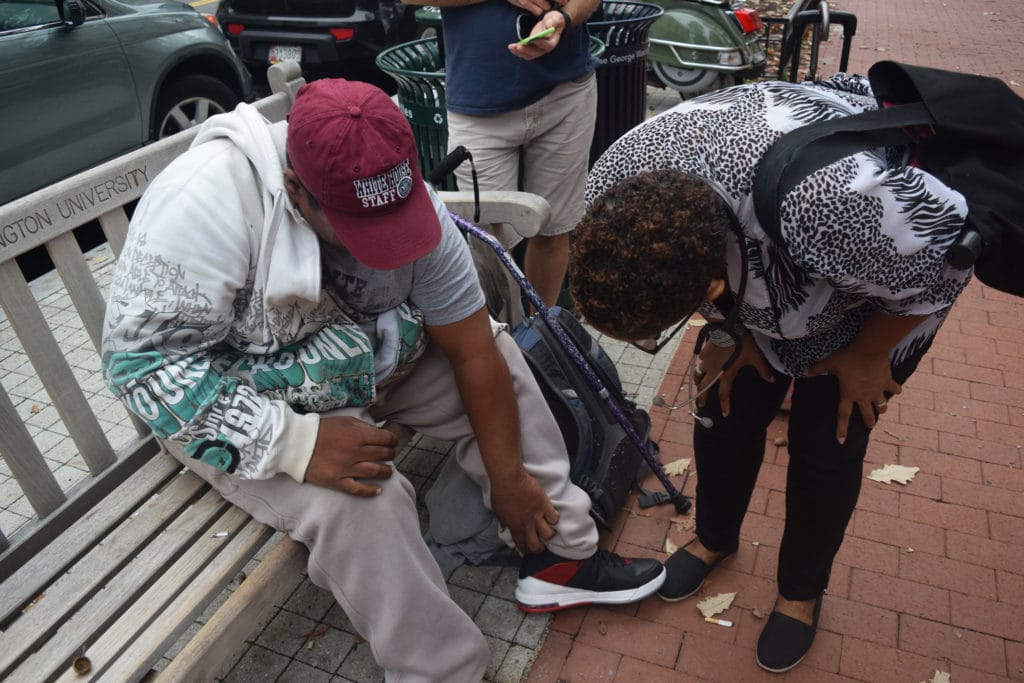This article was featured in the April 15 digital-only edition of Street Sense. Until it is safe to resume person-to-person sales, you’ll always be able to find the current digital-only edition at streetsensemedia.org/Digital. Thank you for reading! Please continue to support our vendors through our mobile app (streetsensemedia.org/App).
Due to the COVID-19 pandemic, homeless service providers are adjusting how they meet the needs of their constituents. The National Alliance to End Homelessness has put together a web-based series to discuss some of the changing strategies.
Iain De Jong, president of OrgCode and creator of the Vulnerability Index – Service Prioritization Decision Assistance Tool that powers the “coordinated entry” model for referrals to housing assistance, facilitated two webinars. Used locally and around the country, the VI-SPDAT is an assessment tool for matching the needs of unsheltered people with appropriate housing options as they become available.
The first webinar focused on serving sheltered and unsheltered persons during the pandemic, De Jong acknowledged, “We are still learning.” He emphasized the importance of outreach. “The last thing we want is people all over looking for food,” he said. “Outreach is necessary.”
De Jong explained that people who are homeless make choices based on their immediate circumstances. Thus, during the pandemic, many have abandoned shelters in favor of being outdoors. De Jong pointed out the benefit of couch surfing and reunification with family members, if possible.
The first webinar included suggestions and strategies to increase safety during the pandemic, which has resulted in closure of many spaces that people experiencing homelessness might normally go to, such as coffee shops and day centers.
De Jong said the public and private sector must continue efforts that were in progress before the pandemic hit. He stressed that right now, even in the midst of a pandemic, “exits” out of homelessness are needed. He warned that coordinated entry should not come to a grinding halt. “Let us not forget that housing is harm reduction,“ he said. He suggested that providers work with people they already know and if the process of getting someone housing has begun, it should continue.
He wants outreach personnel to conduct symptom screening and he encouraged organizations that are working with encampments to develop a “floor plan or site plan” that allows encampment residents to practice social or physical distancing.
During the webinar, guidance from the CDC was mentioned as support for not performing sweeps of homeless encampments. “I’m not a fan of sweeps,“ De Jong said.
De Jong said that outreach workers should know what has changed and street outreach, if done well, will be especially helpful at this time.
“It certainly isn’t business as usual,“ De Jong said when addressing public transit, the use of masks, and medical transportation companies. He urged providers to use a modified street outreach van and personal protective equipment when serving unsheltered persons. Hotels, motels, convention centers, community rec centers, places of worship and arenas were proposed as options for expanded shelter space.
De Jong said this is not the time to work on major roadblocks; it is more important to “take people in our system and move them into housing.” There is a danger that when the pandemic eventually ends, the system will be “overwhelmed.” Backlogs may occur with regard to housing vouchers and homelessness may increase when current restrictions on eviction are lifted.
In the second webinar, the needs of people who are already in housing were addressed. De Jong called for “frontline staff” to support people in housing.
De Jong described the work of OrgCode in developing or refining technologies to connect service providers and clients. He emphasized that how organizations prioritize whom to serve must be defendable and transparent. He urged providers to work with healthcare organizations and recommended that support staff at housing sites screen residents for symptoms. Support staff should be aware that some people are living with food insecurity and financial problems.
He stressed the need to help residents by having standards for apartment cleanliness, personal hygiene, and harm reduction. He also encouraged housing support staff to think about the many ways people get cash, including day labor and panhandling. “Housing support staff should know what financial support exists in [the] community like the backs of their hands,” De Jong said.
He recommended the use of open-ended questions to identify residents’ immediate needs and long-term goals. He stressed the importance of maintaining contact with people who are experiencing violence. He suggested that housing organizations help clients create personalized guest-management policies.
De Jong pointed out that housing organizations should remember the landlords’ needs and make sure rents are paid on time. He recommended such organizations use their connections to landlords to find vacancies.
De Jong supported the use of virtual team meetings and case reviews during the pandemic so that service providers, advocates, and people experiencing homelessness may have continuing connections. He said communities need to think about how to remember the deaths of people affected by COVID-19.
The webinar concluded with words of encouragement for the audience. “Know … that without you, people will feel the impacts of homelessness. Be kind to yourself. Be kind to others. You’re awesome,” De Jong said. “With every community pushed to the brink during the epidemic, it is refreshing to see all over the nation people are banding together to help those who are homeless. Hopefully, … everyone experiencing homelessness [will] make it into housing.”








